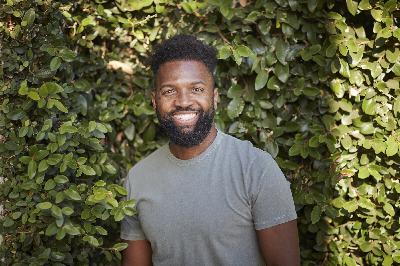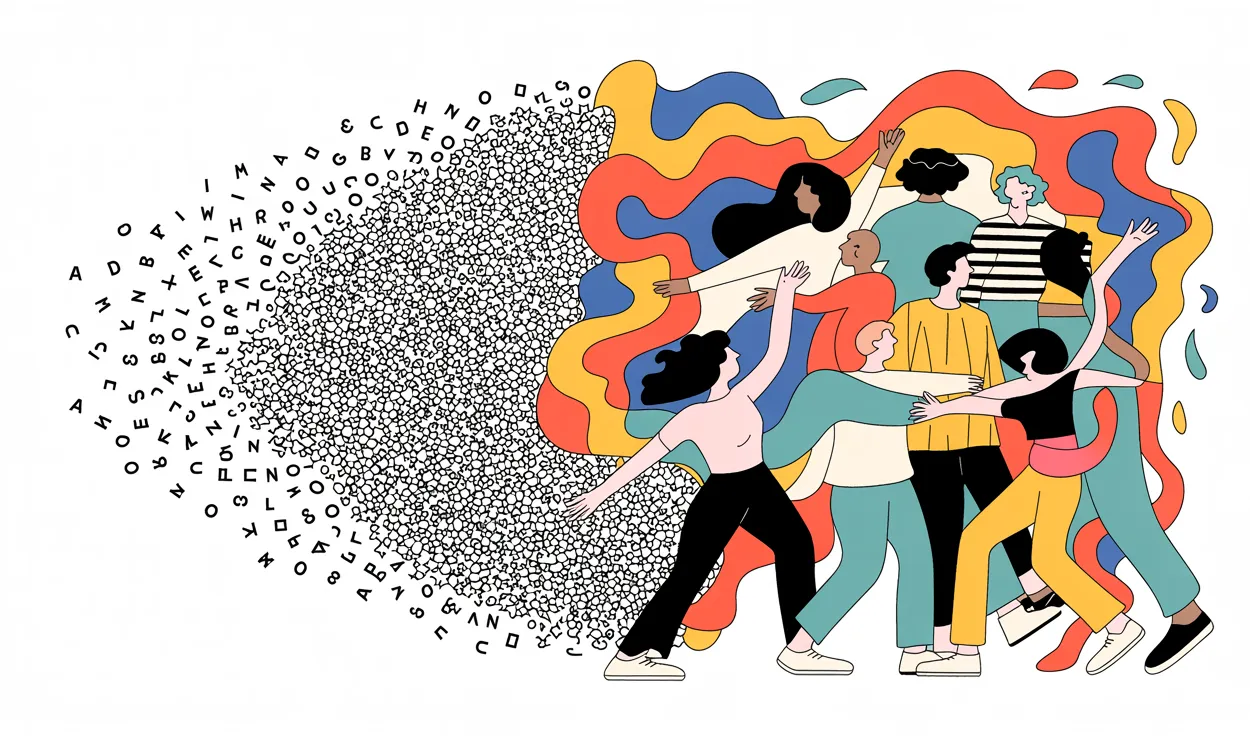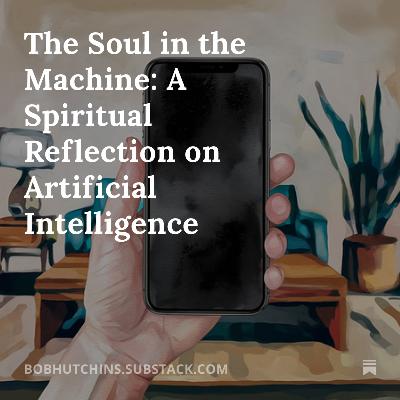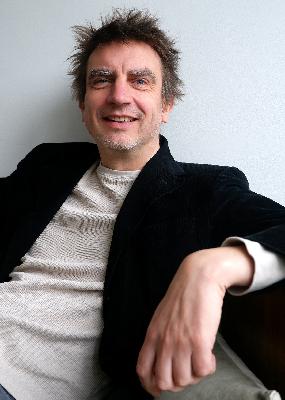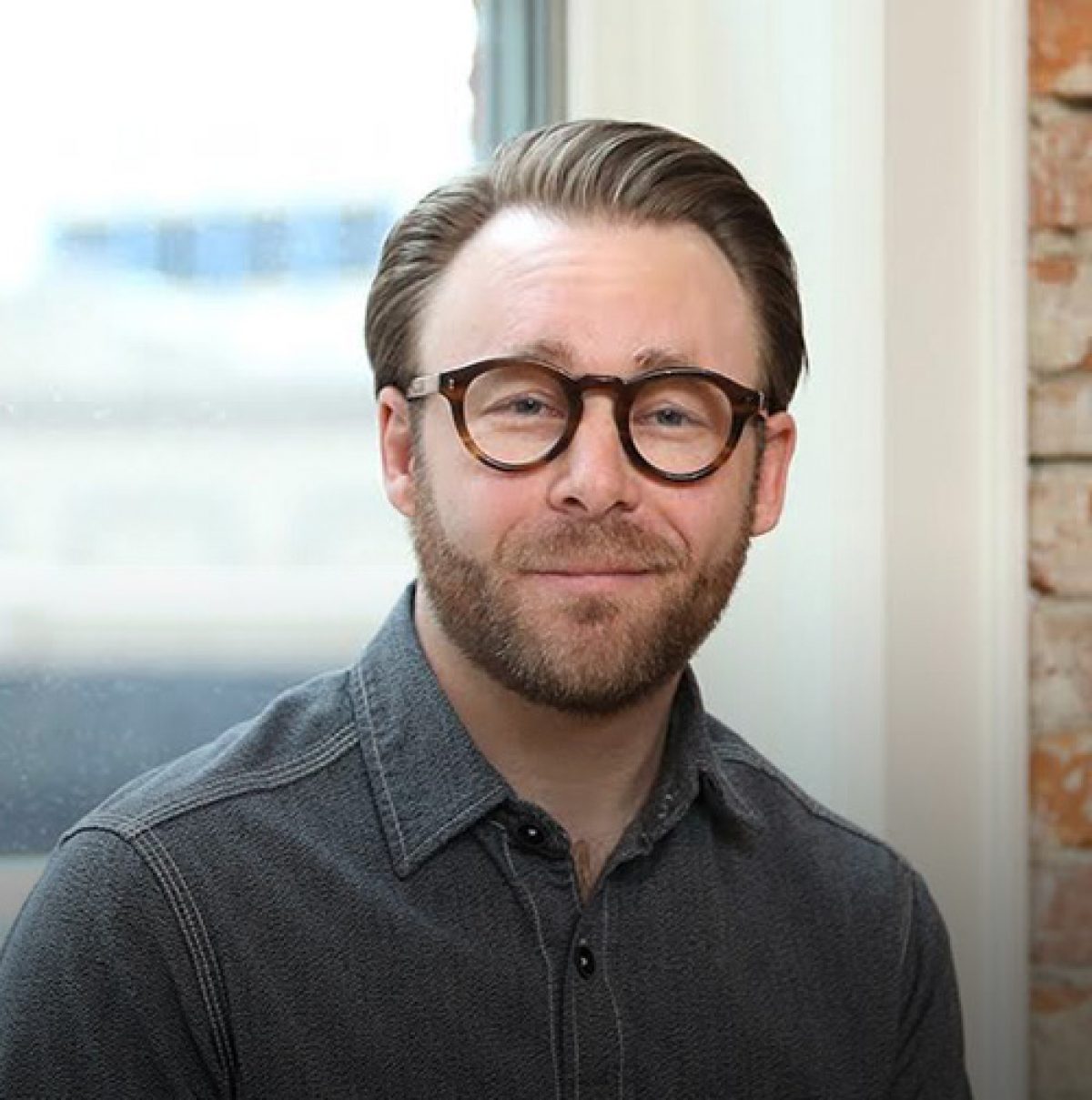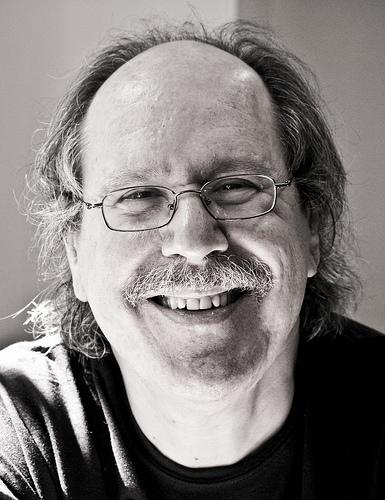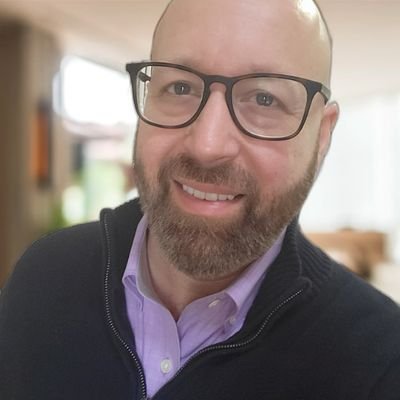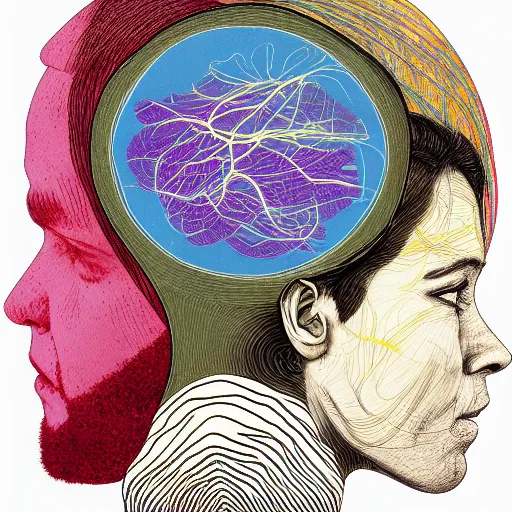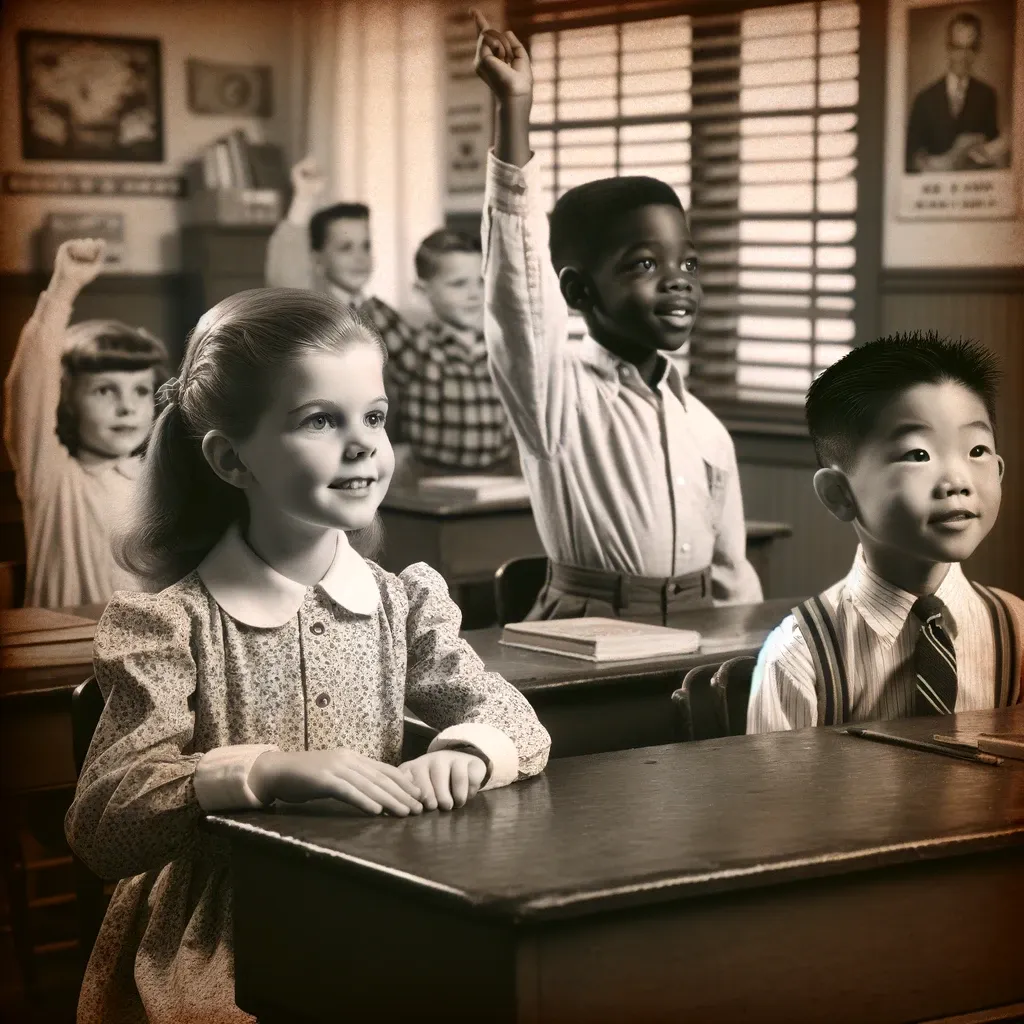Discover The Human Voice with Bob Hutchins
The Human Voice with Bob Hutchins

The Human Voice with Bob Hutchins
Author: Bob Hutchins
Subscribed: 14Played: 493Subscribe
Share
© 2024- Human Voice Media. All Rights Reserved
Description
Bob Hutchins- Digital Marketing OG, Cultural and media theorist, and Organizational Psychologist talks about all things human and restorative. Tech, Psychology, Spirituality, Change, Mental and Social Well Being.
132 Episodes
Reverse
In this episode of The Human Voice, Bob Hutchins sits down with Baratunde Thurston—Emmy-nominated host, writer, comedian, and creator of the podcast Life With Machines. From his roots in Washington, D.C., shaped by a mother who was a computer programmer and activist, through Harvard philosophy and a decade of stand-up, Baratunde has built a career at the intersection of culture, technology, and storytelling. Their conversation ranges from the everyday signals of progress—like coffee shop Wi-Fi and subway calls—to deeper questions about authorship, language, and governance in the age of AI. They explore what it means to share creative space with an AI collaborator, why indigenous languages reveal new possibilities for machine learning, and how democracy might draw wisdom from traditions that put nature and future generations at the center. Baratunde also shares the simple practices that keep him grounded: meditation, meals with people, moving his body, and spending time in the natural world. Together they sketch a vision where technology doesn’t replace our humanity but presses us to return to it with more intention. Themes Infrastructure is culture. Machines can help us think, but they can’t carry grief. Language encodes imagination and culture. Governance should begin with shared values, not with chasing releases. Embodiment is non-negotiable for a human life. Where to find Baratunde Life With Machines on YouTube and podcast platforms Website - https://www.baratunde.com/
In this episode, I step back from the hype and headlines around generative AI to reflect on something deeper: what’s actually happening to our experience of art, creativity, and meaning when machines start making things that feel human. I draw from the work of 1930s philosopher Walter Benjamin—who never saw a chatbot or image model in his life, but somehow understood the psychological and cultural impact of machine-made creativity with stunning clarity. What’s lost when everything becomes a copy Why “aura” and authenticity still matter The shift from ritual to exhibition in creative work What the Jason Allen AI art controversy reveals about our values How new forms of creative labor are emerging—and what that means for writers, artists, educators, and makers Why transparency might matter more than purity in a world of machine collaboration This isn’t a takedown or a celebration of AI. It’s a reflection. A pause. A reminder that we’re not just building tools—we’re reshaping what it means to be human. If you’re a teacher, a marketer, a business leader, a parent, or just someone trying to stay grounded in a rapidly changing world—this one's for you. Resources Mentioned: Walter Benjamin, The Work of Art in the Age of Mechanical Reproduction The 2022 Colorado State Fair AI art controversy Stephen Marche’s AI-assisted novella Death of an Author Artwork- James Allen’s - Théâtre D'opéra Spatial Stay Connected: Want more thoughtful takes like this? Subscribe to the Substack → https://bobhutchins.substack.com Or find me on LinkedIn → linkedin.com/in/bobhutchins Let’s keep asking better questions. —Bob Hutchins
In this thought-provoking episode, Bob Hutchins explores a radical possibility: that we may be witnessing the beginning of the end of humanity's 500-year relationship with the written word. Drawing from media theorists Walter Ong and Harold Innis, Bob examines how generative AI might fundamentally transform not just how we communicate, but how we think and connect as human beings. Since Gutenberg's printing press, we've been compressing the entirety of human experience into alphabetic symbols—a constraint that has both liberated and limited us. While we've become virtuosos of written expression, creating symphonies of meaning from simple letters and punctuation, we've also lost touch with the immediacy and embodied richness of oral culture. Bob argues that AI could serve as more than just a writing assistant—it might become the bridge technology that frees us from the cognitive overhead of translating experience into symbols, allowing us to rediscover richer, more authentic forms of human communication. Key Topics Explored The Gutenberg Legacy How the printing press fundamentally altered human consciousness The trade-offs between abstract thinking and embodied presence Walter Ong's insights on orality versus literacy Media Ecology and Communication Bias Harold Innis's theory of communication bias How different media favor durability versus immediacy The space-biased nature of written civilization The Translation Problem The cognitive burden of converting lived experience into symbols Why meaningful moments often "die in translation" The gap between what we experience and what we can express AI as Liberation Technology How AI might reduce the overhead of symbolic communication The possibility of universal translation between experience and expression Moving beyond AI as writing assistant to AI as cognitive scaffolding Post-Literate Communication Immersive storytelling and embodied performance Collaborative creation and real-time narrative improvisation Visual, spatial, and archetypal forms of expression The return to mythic and symbolic meaning-making The Promise and the Peril Democratizing eloquence for those who struggle to articulate rich inner lives The risk of losing essential cognitive muscles developed through writing Questions of authenticity in AI-mediated communication What happens when written language becomes optional? Two Possible Futures AI as bridge to richer human communication AI as communicative prosthetic leading to human atrophy The importance of conscious navigation during this transition Key Insights "Even at their most transcendent, words remain what they've always been—ghosts of experience, shadows cast by the real thing." "The deepest insights seem to emerge in conversation rather than through explanation, in the spaces where we're figuring something out together rather than delivering prepared thoughts." "How we communicate shapes who we become. If we want AI to help us recover more embodied, authentic forms of expression, we need to be clear about what values we're optimizing for." Questions for Reflection Are we trying to become more efficient communicators or more fully human ones? What would it mean to communicate primarily through embodied presence again? How do we maintain authentic connection when our communications increasingly flow through AI mediators? What practices keep us grounded in embodied experience as AI handles more symbolic communication? About The Human Voice The Human Voice explores the intersection of technology, human flourishing, and authentic communication. Host Bob Hutchins brings together insights from media ecology, contemplative spirituality, and organizational psychology to examine how we can navigate technological change while preserving what makes us most human. Connect with Bob Website: http://www.humanvoicemedia.com LinkedIn: https://www.linkedin.com/in/bobhutchins/ Resources Mentioned Orality and Literacy by Walter Ong The Bias of Communication by Harold Innis Understanding Media by Marshall McLuhan The Gutenberg Galaxy by Marshall McLuhan
🎧 Show Notes (The Human Voice with Bob Hutchins): In this special episode, Bob Hutchins sits down with Dr. Tom Cooper—media ethicist, scholar, and former assistant to Marshall McLuhan—to unpack the lives and legacies of two of the most influential (and often misunderstood) thinkers in media history: Harold Innis and Marshall McLuhan. Dr. Cooper shares insights from his new book Wisdom Weavers, offering rare stories from his time at the University of Toronto, reflections on the inner lives of both men, and how their ideas help us understand our AI-saturated, media-driven world today. We explore: Why Innis and McLuhan still matter in 2025 How their contrasting backgrounds (a stoic economist vs. a poetic provocateur) converged into a shared vision The quiet presence of women behind their work What McLuhan might say about AI, selfies, and the illusion of intelligence How both thinkers anticipated today’s blurred line between human and machine communication Whether you’re new to media ecology or deep in the trenches, this episode is a rich entry point to understanding the patterns behind the platforms—and why awareness, not alarm, might be our most important tool. 📚 Mentioned: Wisdom Weavers: The Lives and Thought of Harold Innis and Marshall McLuhan by Tom Cooper The Toronto School of Communication McLuhan’s The Gutenberg Galaxy The Sorcerer’s Apprentice, Pinocchio, and other McLuhan metaphors AI, ethics, and modern-day media fasts Tom Cooper is a media scholar, author, and former assistant to Marshall McLuhan. He earned his doctorate at the University of Toronto, where he studied with leading figures in the Toronto School of Communication, and later taught media ethics for decades at Emerson College after earlier roles at Harvard. He is the founder of the Association for Responsible Communication, which was nominated for the Nobel Peace Prize, and previously served as an assistant speechwriter in the White House. Over his career, he authored more than ten books and 300 published articles and reviews, weaving together scholarship, ethics, and global engagement. Cooper’s sabbatical work as a guest scholar took him to Princeton, Oxford, Cambridge, Yale, Stanford, Berkeley, and other leading institutions. He is also a black belt in Tae Kwon Do—a reminder that his commitment to discipline and balance extended beyond the classroom.
🧠 Episode Overview: As someone who works at the intersection of AI, media psychology, and leadership, I’m not just interested in tech—I’m interested in the human behind the tech, and those who think similar. My guest is Faisal Hoque, a three-time founder, Deloitte Technology Fast 500 winner, and author of the deeply timely and thoughtful book Transcend: Unlocking Humanity in the Age of AI. We explore what it really means—not just to be human, but to stay human—as artificial intelligence reshapes our decisions, our creativity, and our society. This episode blends deep reflection with practical insight: from AI as mirror and partner, to frameworks for responsible experimentation, to what we must protect—and reclaim—in a world of machine intelligence. 🔍 What We Cover: Why Faisal wrote Transcend and what “transcendence” really means in the AI era How AI subtly rewires our language, habits, and emotional lives What autocomplete and generative tools are teaching us about ourselves The danger of outsourcing too much—and the power of asking better questions The OPEN and CARE frameworks for individuals, organizations, and governments How to “catastrophize” with wisdom, not fear Why creativity and authenticity are making a comeback The moral imperative of AI kill switches, regulation, and restraint A hopeful closing: how we can lead with both care and courage 📘 Get the Book: Transcend: Unlocking Humanity in the Age of AI Available wherever books are sold → https://amzn.to/432sWwK
This is a read of my latest article- The Soul in the Machine: A Spiritual Reflection on Articficial Intelligence. https://bobhutchins.substack.com/p/the-soul-in-the-machine-a-spiritual The following reflection is taken from my latest Substack piece, The Soul in the Machine, A spiritual reflection on AI. Lately, I’ve been sitting with some deeper questions—ones that don’t always make the headlines but seem to live just beneath them. We’re in a strange, significant moment. AI is evolving fast, yes—but so are we. Or at least, we’re being invited to. This isn’t a post about tech hype or fear. It’s about attention. Presence. What we lose or forget when we rush ahead without asking: What is all this doing to us? Not just cognitively, but spiritually, emotionally, relationally. I wrote this as a kind of pause. A chance to reflect—not on whether machines are becoming more human, but whether we’re remembering what it means to be fully human ourselves. Thanks for listening.
Online conversations have become a battleground—cheering certain words, booing others. Ideas and nuance are lost to labels that divide and dehumanize. When did we start trading dialogue for definitions? In "The War of Words: Why Our Labels are Destroying Our Humanity," I explore how we've replaced genuine communication with tribal jargon and reactive outrage. More than ever, it's crucial to reclaim empathy, curiosity, and humility to bridge divides rather than deepen them. The words we choose shape our world. Let's choose wisely. I honestly would really love to hear your thoughts on this. #communication #words
Christopher Summerfield, Oxford Neuroscientist & Former DeepMind Researcher Episode Summary: In this episode, I sit down with Christopher Summerfield, an Oxford neuroscientist and former DeepMind researcher who has spent his career studying how human brains work and how AI models can replicate cognitive processes. His new book, These Strange New Minds: How AI Learned to Talk and What It Means, explores the evolution of AI from early chatbots to today's advanced language models. We discuss the key breakthroughs in AI, the parallels between human and machine reasoning, and the ethical questions surrounding AI’s role in shaping our world. If you’re curious about how AI is changing not just technology, but human thought itself—this conversation is for you. Key Takeaways: 🔹 From Neuroscience to AI – Christopher's journey from studying human cognition to working at DeepMind was shaped by a key question: How do brains and machines process information differently? 🔹 The Transformer Revolution – The biggest breakthrough in AI’s ability to "talk" wasn’t just training on more data—it was the invention of the transformer model in 2017, which dramatically improved language understanding. 🔹 Do AI and Human Brains Work the Same? – AI can store knowledge and reason about it, but it lacks human motivation, creativity, and initiative, which are fundamental aspects of intelligence. 🔹 The Creativity Debate – Will AI enhance human creativity or dilute it? Christopher explores how generative AI is reshaping art, storytelling, and meaning-making in a world where machines can generate content. 🔹 AI’s Influence on Society – AI isn't just a tool; it’s a force that shapes human beliefs, behaviors, and decision-making. We discuss the growing concern over how AI-driven persuasion will impact advertising, politics, and workplace dynamics. 🔹 The Future of AI & AGI – Is Artificial General Intelligence (AGI) just around the corner? Christopher believes we overestimate AI’s capabilities while underestimating the complexity of human cognition. Memorable Moment: Christopher breaks down the difference between AI “hallucinations” vs. human memory—showing how confabulation in AI mirrors how people misremember events, and why truth and social norms in AI-generated content are still evolving. Get Christopher's Book: 📖 These Strange New Minds: How AI Learned to Talk and What It Means – Available March 2024 on Amazon and major bookstores.
In this episode, I sit down with Shideh Doerr, a natural connector and networking ambassador with over 25 years in healthcare. Shideh’s journey took a turn when she co-founded JabberYak, a company designed to make networking more organic and meaningful. We explore her Persian-American roots, her transition from healthcare to entrepreneurship, and how JabberYak is revolutionizing human connection in business and education. Key Takeaways: 🔹 The Power of Connection – Growing up in a Persian household, Shideh learned the importance of hospitality and belonging, which became the foundation of her career. 🔹 From Healthcare to Innovation – After decades in healthcare, bureaucracy stifled her creativity, leading her to co-found JabberYak, blending technology with psychology to foster real conversations. 🔹 Seven Degrees of Connection – JabberYak is based on research showing that people are most likely to connect over seven key interests. This principle powers their tech and icebreaker tools. 🔹 Bridging Social Gaps in Business & Education – From corporate conferences to university campuses, JabberYak helps introverts and extroverts alike find their tribe, reducing social anxiety and loneliness. Connect with Shideh & Jabber Yak: 🌐 Website: www.jabberyak.com 🔗 LinkedIn: Shideh Doerr
Guest Spotlight: David Whitesock, founder of Commonly Well and creator of the Recovery Capital Index, discusses his mission to bring data-driven insights to addiction recovery and mental health. From Struggle to Innovation: David shares his personal journey from addiction and incarceration to law school, leading him to develop a measurable approach to recovery. Beyond Sobriety Metrics: Commonly Well challenges traditional recovery models by integrating behavioral analytics, long-term strategy, and human-centered data to improve patient outcomes. The Wellness Industry’s Blind Spots: David highlights the need to shift mental health care upstream, focusing on early interventions instead of only treating severe cases. Personalization vs. Universal Principles: The conversation explores how data can drive tailored wellness strategies while maintaining a shared foundation for mental health support. Future of AI in Behavioral Health: David envisions AI-powered insights, wearable technology, and psycholinguistics revolutionizing how therapists and organizations support recovery. • Connect: Learn more at commonlywell.com or find David on LinkedIn.
In his third appearance on The Human Voice, media theorist and science fiction author Paul Levinson shares a fascinating conversation about the timeless relevance of media ecology, technology’s role in human progress, and the myths surrounding information overload. Paul reflects on his seminal 1996 article On Behalf of Humanity and its argument that the issue isn’t too much information but a lack of organizational tools. Drawing connections between historical innovations and today’s AI landscape, Paul explores the concept of “remedial media”—new technologies that solve problems created by previous ones—and how it applies to challenges like algorithmic bias and deep fakes. From his collaborations with media icons Neil Postman and Marshall McLuhan to his optimistic vision for technology as a force for good, Paul offers insights that resonate across decades. The episode wraps up with Paul’s thoughts on techno-pessimism, the power of storytelling, and a fun recommendation for mystery fans: A Perfect Couple. He also highlights his recent alternate history book, Real Life: An Alternate History of The Beatles, imagining a world where John Lennon was never assassinated. Key Topics Covered: • Information overload vs. information organization • Remedial media as a framework for technological progress • AI, digital watermarks, and the future of human-machine collaboration • Why techno-pessimism often gains more attention • Recommendations for media and books Tune in for a thought-provoking discussion that spans history, technology, and the enduring human connection to media.
Chris Dauphin is an 18-year marketing and communications veteran, professional musician, sports fan, father, son, and human. And he's a close friend. This was a fun interview that surfaced some deep truths about life, work, and the meaning of it all. Enjoy!
Some of my thoughts from an article I wrote for my Substack Newsletter about how we are all interconnected more than we know through this thing called the internet, technology, and AI. And we are mimicking what Obi-Wan was sensing. “I felt a great disturbance in the Force as if millions of voices suddenly cried out in terror and were suddenly silenced. I fear something terrible has happened.” -Ben Obi-Wan Kenobi, Star Wars
This is a reading of my Substack Article- The Lost Art of Questioning: Can AI Bring It Back? https://bobhutchins.substack.com/p/the-lost-art-of-questioning-can-ai AI's evolving abilities highlight the humanness woven through good questions. (Prompts) As AI gets smarter, might it even start teaching us back by teaching us to ask those open-ended, thought-provoking questions that truly make us learn and grow? Here's a hopeful thought: perhaps AI can transcend mere information gathering, evolving into a catalyst for a culture that nurtures intellectual exploration. I unpack this more in my article.
Kristin Kobes Du Mez is Professor of History and Gender Studies at Calvin University. She holds a PhD from the University of Notre Dame and her research focuses on the intersection of gender, religion, and politics. She has written for the Washington Post, NBC News, Religion News Service, Christianity Today, and The Daily Beast, and has been interviewed on NPR, CBS, and the BBC, among other outlets. Her most recent book is Jesus and John Wayne: How White Evangelicals Corrupted a Faith and Fractured a Nation.
Dr Tara Swart is a neuroscientist, former medical doctor specialized in psychiatry, lecturer at MIT Sloan and author of best seller ‘The Source - The secrets of the universe, the science of the brain’. She is also trustee for the Lady Garden Foundation, a charity for gynecological cancers.
I interview my oldest son, Riley Hutchins. He and his wife, Emily, live in Los Angeles. We talk about his life journey thus far, the experience of Covid lockdown, and what he wishes he could tell his younger self. This was a fun interview, to get to interview my adult offspring, and learn some things.
David Dark is a professor at Belmont University who also teaches at Riverbend Maximum Security Institution. A resident of Nashville, Tennessee, he attempts to raise children and live a life of mindfulness with singer/songwriter Sarah Masen.
Steven Pressfield wrote for 27 years before he got his first novel published (The Legend of Bagger Vance). During that time he worked 21 different jobs in eleven states. Steve and I talk about the life of a creative, with references to his book- The War of Art. His new novel is called, A Man at Arms. We also take a deep dive into the personal experience and transformation of the hero's journey and what personal transformation looks and feels like.
Jenny Black, LMFT is back again on Rumors of Grace. We talk about how media in the age of Covid, politics, and world change, can create an environment of stress, trauma, and even unconscious micro-traumas that can have devasting effects on our selves, our families, and those around us. We discuss how to recognize it, our own bias, and positive tips moving forward.


